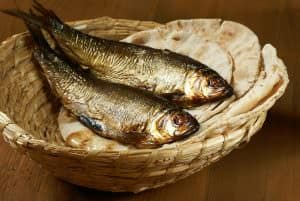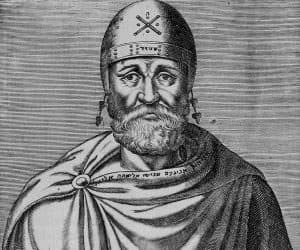Feeding
 The sun sets over still waters, all the people reclining on the grass. Jesus takes the loaves in his hands, breaking and blessing them. According to Matthew’s account, 5000 men, apart from women and children, were fed that day. It was, it seems, a prefiguring of the Eucharist: and indeed at every celebration of the Eucharist the priest takes, blesses, breaks, and gives the bread to the people, just as Jesus did on the seashore. Moreover, in the next feeding narrative we hear that Jesus gives thanks–the Greek verb being eucharisto.
The sun sets over still waters, all the people reclining on the grass. Jesus takes the loaves in his hands, breaking and blessing them. According to Matthew’s account, 5000 men, apart from women and children, were fed that day. It was, it seems, a prefiguring of the Eucharist: and indeed at every celebration of the Eucharist the priest takes, blesses, breaks, and gives the bread to the people, just as Jesus did on the seashore. Moreover, in the next feeding narrative we hear that Jesus gives thanks–the Greek verb being eucharisto.
Jesus blesses the bread, his eyes cast up to heaven. He consecrates it, and it becomes something more than bread for the satisfying of bodily hunger: he immerses it in heaven, and in the creativity and activity of the divine Word. It becomes the bread of life—bread to quell the hunger of the soul.
A prefiguring of the Eucharist indeed. The Buddhist monk Thich Naht Hanh, who was a great friend of Christianity and especially of the contemplative Thomas Merton, said these words about the life-giving bread:
When a priest performs the Eucharistic rite, his role is to bring life to the community. … Holy Communion is a strong bell of mindfulness … If we allow ourselves to touch our bread deeply, we become reborn, because our bread is life itself. Eating it deeply, we touch the sun, the clouds, the earth, and everything in the cosmos. We touch life, and we touch the kingdom of God.
So it was on the shores of lake Galilee, under the shimmering stars. Christ brings life to the hungry and  exhausted crowd. It was something like the appearance of that strange food in the Egyptian desert, the manna, which quelled the deep hunger of Israel—not only its physical hunger, but its spiritual hunger too. The bread of God came down from heaven, reassuring Israel that God would lead them out, that God was their true food and sustenance, their common life. They did not gorge themselves greedily; no, they went out daily to gather, each just enough for his or her need. Therefore this bread for Israel was a social miracle. It was a feast of charity, knitting them together as one people.
exhausted crowd. It was something like the appearance of that strange food in the Egyptian desert, the manna, which quelled the deep hunger of Israel—not only its physical hunger, but its spiritual hunger too. The bread of God came down from heaven, reassuring Israel that God would lead them out, that God was their true food and sustenance, their common life. They did not gorge themselves greedily; no, they went out daily to gather, each just enough for his or her need. Therefore this bread for Israel was a social miracle. It was a feast of charity, knitting them together as one people.
Jesus’ feeding of the five thousand has all of this significance. It was a very simple meal, undoubtedly; but for all the modest fare of loaves and fishes, it was a spiritual feast. It bespeaks our basic dependency on God, on the fruit of the earth and sea, and indeed on one another. You might imagine that the people felt a new life flowing in their veins; they felt at one with the cosmos. As all of them shared the loaves among themselves, there was, in the story, a mysterious multiplication: this is, I think, a symbol. For when they share the bread they bestow something more, something surplus: there is a multiplication. The bread becomes gift: everyone shares themselves. The pieces, gathered up, are more than the sum of their parts. We are reminded that the true feast is our participation one in another–and in God who is among us.
Surely we need to learn anew that sharing is the basis of all friendship, and therefore of society itself; it is an old truth, not much heard of recent times. Yet when we share, we draw near to the God whose nature is communion, koinonia; and we look to heaven, where there will be a freer entwinement of spirits than is possible here.
A feast of charity, the feast of friendship on the shores of the Galilean Sea: but notice, immediately before it, a dramatic counterpoint—the birthday feast of Herod. That is a feast of lawlessness, a feast of debauchery and crime and greed. Herod’s daughter dances for the delectation of the crowd; and she persuades her father to have John the Baptist’s head brought out on a platter. This feast issues not in friendship but in murder.
 I remember, once, reading an account written by the Jewish philosopher and theologian, Philo, who wrote around the time of Jesus. He describes an unholy banquet, in the style he associated with Greece and Rome. It is worth repeating. He says seven tables are brought in… “of terrestrial, and acquatic, and flying creatures,” all with different dressings and seasonings. “…afterwards some of the dishes are carried away empty from the insatiable [greed] of those at table, who, gorging themselves like cormorants, devour all the delicacies so completely that they gnaw even the bones, which some left half eaten [tearing them to pieces and spoiling them]. And when they are completely tired with eating, having their bellies filled up to their very throats, [their desires were still unsatisfied; they were fatigued with eating.] (De Vita Contemplativa (slightly adapted), p. 56)
I remember, once, reading an account written by the Jewish philosopher and theologian, Philo, who wrote around the time of Jesus. He describes an unholy banquet, in the style he associated with Greece and Rome. It is worth repeating. He says seven tables are brought in… “of terrestrial, and acquatic, and flying creatures,” all with different dressings and seasonings. “…afterwards some of the dishes are carried away empty from the insatiable [greed] of those at table, who, gorging themselves like cormorants, devour all the delicacies so completely that they gnaw even the bones, which some left half eaten [tearing them to pieces and spoiling them]. And when they are completely tired with eating, having their bellies filled up to their very throats, [their desires were still unsatisfied; they were fatigued with eating.] (De Vita Contemplativa (slightly adapted), p. 56)
It is a godless and lawless feast, bringing spiritual exhaustion. The guests at Herod’s birthday feast do not remember the God of communion, who bids us restrain our desires for the sake of one another, who would gather us around a simple table, with good, simple fare.
And this is, I think, a social commentary. God’s people, the priestly people, are not in royal courts with splendid entertainments, but are the humble ones sitting by the Sea of Galilee, sharing the bread that is broken by the hands of their Lord. And here is also a lesson for us: that God is to be found in restraint, in sharing, in simplicity.
And that is what we remember at the Eucharist, when all of us, rich and poor, gather around the altar in great simplicity, seeking the bread of life.
May we eat of this bread always.
Amen


